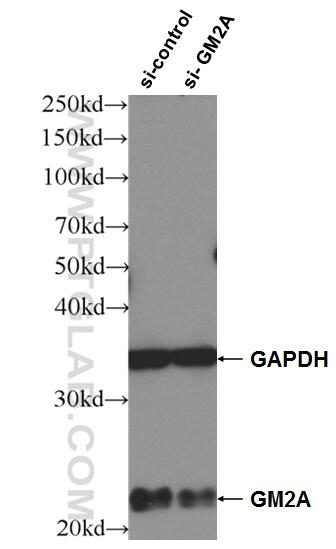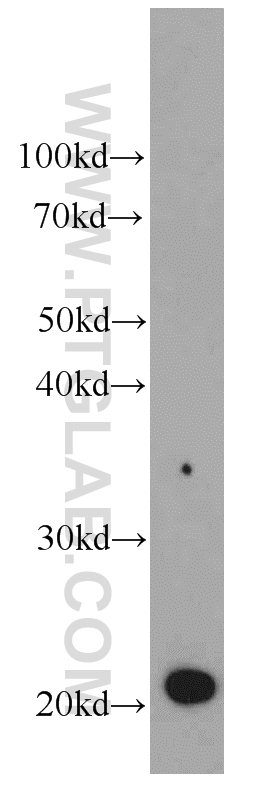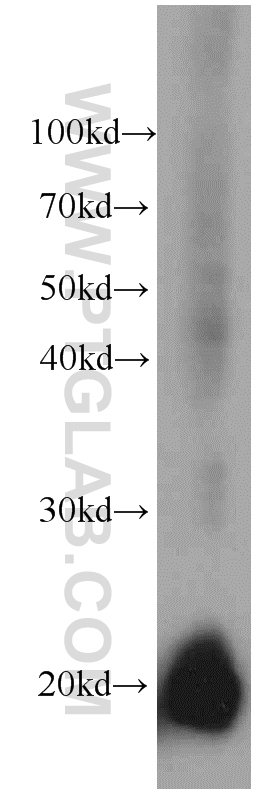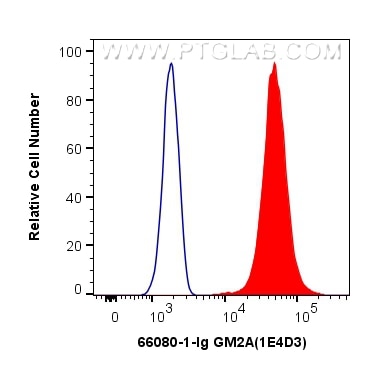- Featured Product
- KD/KO Validated
GM2A Monoclonal antibody
GM2A Monoclonal Antibody for WB, FC, ELISA
Host / Isotype
Mouse / IgG2a
Reactivity
human
Applications
WB, FC, ELISA
Conjugate
Unconjugated
CloneNo.
1E4D3
Cat no : 66080-1-Ig
Synonyms
Validation Data Gallery
Tested Applications
| Positive WB detected in | Hela cells, human placenta tissue |
| Positive FC detected in | HEK-293 cells |
Recommended dilution
| Application | Dilution |
|---|---|
| Western Blot (WB) | WB : 1:500-1:1000 |
| Flow Cytometry (FC) | FC : 0.40 ug per 10^6 cells in a 100 µl suspension |
| It is recommended that this reagent should be titrated in each testing system to obtain optimal results. | |
| Sample-dependent, Check data in validation data gallery. | |
Product Information
66080-1-Ig targets GM2A in WB, FC, ELISA applications and shows reactivity with human samples.
| Tested Reactivity | human |
| Host / Isotype | Mouse / IgG2a |
| Class | Monoclonal |
| Type | Antibody |
| Immunogen | GM2A fusion protein Ag4394 |
| Full Name | GM2 ganglioside activator |
| Calculated Molecular Weight | 22 kDa |
| Observed Molecular Weight | 22 kDa |
| GenBank Accession Number | BC009273 |
| Gene Symbol | GM2A |
| Gene ID (NCBI) | 2760 |
| RRID | AB_11182593 |
| Conjugate | Unconjugated |
| Form | Liquid |
| Purification Method | Protein A purification |
| Storage Buffer | PBS with 0.02% sodium azide and 50% glycerol pH 7.3. |
| Storage Conditions | Store at -20°C. Stable for one year after shipment. Aliquoting is unnecessary for -20oC storage. 20ul sizes contain 0.1% BSA. |
Background Information
GM2A, also named as GM2-AP and SAP-3, is the large binding pocket which can accommodate several single chain phospholipids and fatty acids. GM2A also exhibits some calcium-independent phospholipase activity. It plays a key role in the degradation of ganglioside GM2 (GM2). GM2A stimulates only the breakdown of ganglioside GM2 and glycolipid GA2 by beta-hexosaminidase A.
Protocols
| Product Specific Protocols | |
|---|---|
| WB protocol for GM2A antibody 66080-1-Ig | Download protocol |
| FC protocol for GM2A antibody 66080-1-Ig | Download protocol |
| Standard Protocols | |
|---|---|
| Click here to view our Standard Protocols |





